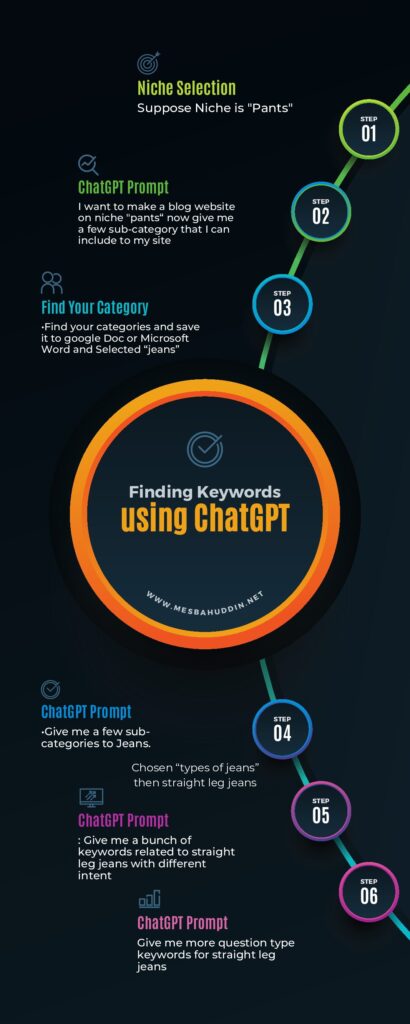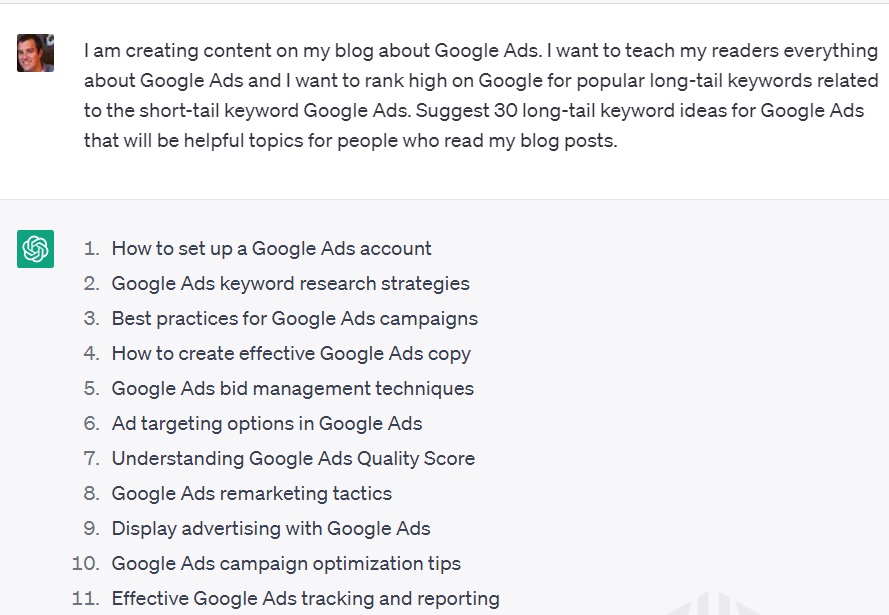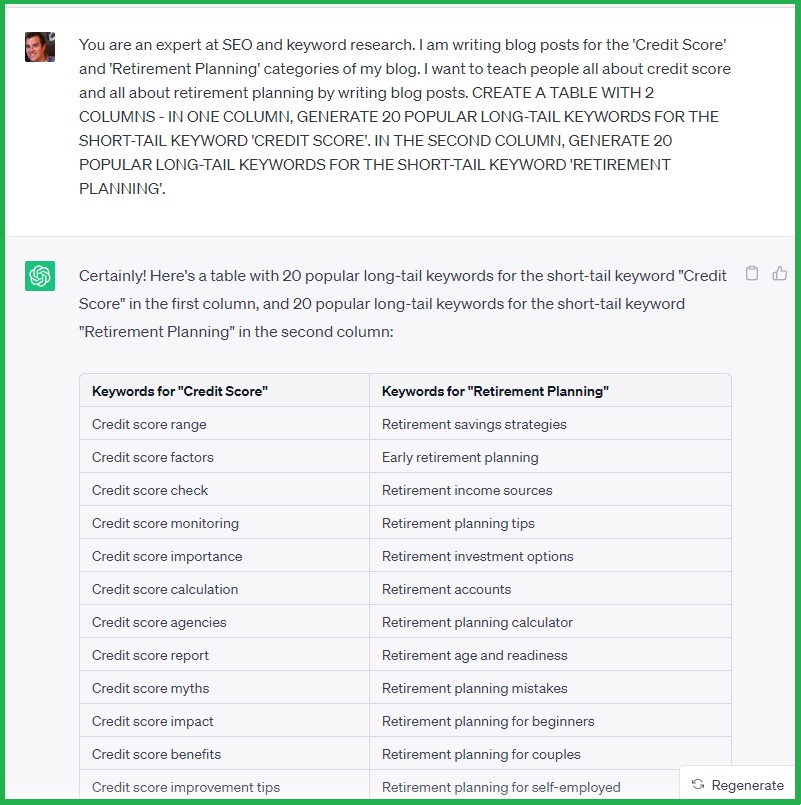Are you looking to boost your blog’s visibility and reach a wider audience? One of the most effective ways to achieve this is through keyword research. By understanding the search terms your target audience is using, you can optimize your blog content and improve its chances of ranking higher in search engine results. In this article, we will explore how you can leverage the power of ChatGPT prompts to conduct keyword research for your blog website.

Keyword research is the process of identifying the specific words and phrases that people are searching for on search engines. By incorporating these keywords into your blog content, you can increase the likelihood of your website appearing in relevant search results. Traditionally, keyword research has been a time-consuming and sometimes tedious task.
However, with the advancements in artificial intelligence, tools like ChatGPT prompts can make the process more efficient and user-friendly. In this guide, we will delve into the steps you can take to leverage ChatGPT prompts for effective keyword research, helping you optimize your blog and drive more organic traffic to your website.
- Start by brainstorming relevant topics and themes for your blog.
- Use keyword research tools like Google Keyword Planner, SEMrush, or Ahrefs to identify popular and relevant keywords.
- Analyze the search volume, competition, and relevance of the keywords to choose the best ones for your blog.
- Incorporate the selected keywords naturally in your blog content, including headings, subheadings, and meta tags.
- Regularly monitor and update your keyword strategy based on changes in search trends and user behavior.

How to Do Keyword Research for a Blog Website Using ChatGPT Prompts
Follow the steps below to get started.
Step 1: Understand Your Blog’s Niche and Target Audience
Before diving into keyword research, it’s essential to have a clear understanding of your blog’s niche and target audience. Consider the topics you cover and the interests of your readers. This knowledge will help you identify relevant keywords that align with your blog’s content and resonate with your target audience.
Use ChatGPT prompts to brainstorm ideas related to your niche and audience. Engage in a conversation with the model, asking questions like “What are popular topics in [your niche]?” or “What are the interests of [your target audience]?” Take note of the keywords or phrases that emerge from these prompts. This will serve as a foundation for your keyword research.
Step 2: Generate Keyword Ideas with ChatGPT
With a basic understanding of your blog’s niche and target audience, it’s time to generate keyword ideas using ChatGPT. Start by asking the model open-ended questions such as “What are some relevant keywords for my blog?” or “What are popular search terms in [your niche]?” ChatGPT will provide you with a list of potential keywords based on its language model and previous knowledge.
Experiment with different prompts and variations to generate a comprehensive list of keyword ideas. Consider long-tail keywords, which are more specific and targeted, as they often have less competition and can drive highly relevant traffic to your blog website.
Frequently Asked Questions
Here are some commonly asked questions about how to do keyword research for a blog website using ChatGPT prompts.
1. What is keyword research and why is it important for a blog website?
Keyword research is the process of finding and analyzing the words and phrases that people use to search for information on search engines. It is important for a blog website because it helps in understanding the topics and terms that your target audience is interested in. By incorporating these keywords into your blog content, you can improve your website’s visibility and attract more organic traffic from search engines.
Keyword research also helps you identify the competition level for specific keywords, allowing you to choose less competitive keywords that can give you a better chance of ranking higher in search engine results pages (SERPs). This research helps you optimize your blog posts and improve your overall SEO strategy.
2. How can ChatGPT prompts assist in keyword research for a blog website?
ChatGPT prompts can assist in keyword research for a blog website by generating ideas and suggesting relevant keywords. You can provide ChatGPT with a topic or a question related to your blog niche, and it can generate a list of potential keywords based on its understanding of the topic and its vast knowledge base.
By using ChatGPT prompts, you can leverage the power of artificial intelligence to come up with new keyword ideas that you might not have thought of before. It can help you expand your keyword list and discover long-tail keywords, which are more specific and have less competition. ChatGPT can provide valuable insights and assist you in refining your keyword research process.
3. What are some effective tools for keyword research?
There are several effective tools available for keyword research. Some popular ones include:
– Google Keyword Planner: This tool allows you to discover keywords related to your blog niche and provides data on search volume and competition.
– SEMrush: SEMrush provides comprehensive keyword analysis, including search volume, keyword difficulty, and competitor analysis.
– Ahrefs: Ahrefs offers a wide range of SEO tools, including keyword research, backlink analysis, and competitor research.
– Moz Keyword Explorer: Moz’s keyword research tool provides insights into keyword difficulty, search volume, and organic click-through rates.
These tools can help you find relevant keywords, analyze their search volume and competition, and gain insights into your competitors’ keyword strategies. It is recommended to use a combination of tools to get a comprehensive understanding of keyword opportunities.
4. How can long-tail keywords benefit a blog website?
Long-tail keywords are longer and more specific keyword phrases that typically have lower search volume and less competition. While they may not drive high volumes of traffic individually, they can collectively attract a significant amount of targeted traffic to your blog website.
Long-tail keywords allow you to target a specific audience and cater to their specific needs and interests. They often indicate that the searcher is looking for something specific, which means they are more likely to convert into a lead or a customer. By optimizing your blog content for long-tail keywords, you can increase the chances of ranking higher in search engine results for these targeted searches and attract a relevant and engaged audience.
5. How frequently should keyword research be conducted for a blog website?
Keyword research is an ongoing process that should be conducted periodically to stay up-to-date with the evolving search trends and the changing interests of your target audience. It is recommended to perform keyword research at regular intervals, such as monthly or quarterly, depending on the nature of your blog website and the industry you are in.
By regularly conducting keyword research, you can identify new keyword opportunities, monitor the performance of existing keywords, and stay ahead of your competition. It allows you to adapt your content strategy and optimize your blog posts based on the keywords that are driving the most traffic and engagement to your website.

How To Do Keyword Research With ChatGPT
In conclusion, mastering the art of keyword research is essential for any blogger looking to boost the visibility and reach of their website. Through the use of ChatGPT prompts, bloggers can tap into the power of artificial intelligence to generate relevant and high-performing keywords.
This innovative approach not only saves time but also ensures that bloggers are able to stay ahead of the competition in the ever-evolving world of SEO.
By following the step-by-step process outlined in this guide, bloggers can confidently navigate the intricacies of keyword research. From brainstorming initial ideas to refining the list of keywords, ChatGPT prompts provide invaluable assistance throughout the entire process.
With the right keywords in hand, bloggers can optimize their content, attract more organic traffic, and ultimately achieve their blogging goals. So, go ahead and embrace the power of AI-driven keyword research using ChatGPT prompts, and watch your blog website soar to new heights.






